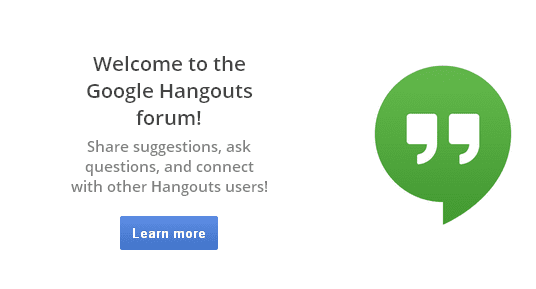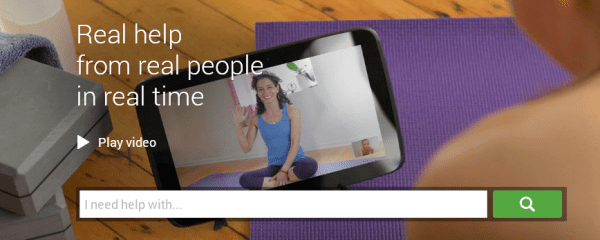Google Helpouts are the latest in a long line of services from Answers through Knol
From when Google Search launched in 1997, Google has always been trying to find the best answers to its users' queries. Google Helpouts are the latest approach to help answer users queries, but in a quite different way to standard search.
Did you know that Google briefly tried a similar approach before? In order to provide a more dedicated response to users' queries, in Aug 2001 Google decided to launch 'Google Questions and Answers'. This service allowed users to send their questions by email and for a flat fee of US $3 Google staffers would reply to those questions. Unfortunately the Google service ran for only 24 hours, after which it was shut down due to excessive demand!
This was followed by 'Google Answers' in April 2002. This was different in the sense as the users were asking other users (researchers) for answers and were willing to pay the researchers between $2 to $200 to for an answer. Google were charging 50 cent fee for posting a question and was keeping 25% of the reward money.
Although the service was receiving more than 100 questions per day but Google decided to shut it down in December 2006 saying that Answers community's limited size and other product considerations made it more effective for Google to focus its efforts on other ways to help its users find information.
Then came Knol, which was launched in 2007 as a method for authors to work together to create authoritative articles about specific topics that they know about.
In Oct 2012 Google decided to shut down Knol and said that it was prioritizing its product efforts so it can make things much simpler for its users and devote more resources to high impact products.
However, in order to continue the fostering of creation of very informative and authoritative content, Google worked with Solvitor and Crowd Favorite to create Annotum whereby all of the content from Knol was passed over to Annotum (launched on November 22, 2011 as an open-source, open-process, open-access scholarly authoring and publishing platform based on WordPress).
So what are Google Helpouts all about?
And now, on November 5, 2013, Google has launched Helpouts where users can get answers to their queries via a live one to one video chat (using Google Hangouts) from over a thousand pre-screened 'providers' (experts from all different fields).

The providers include individuals, small and medium businesses as well as well known brands and they have the option to offer their services for free or ask for a set fee for a specified amount of time or even charge by minute. Payment transactions are use Google Wallet and Google takes a 20% cut out of the fees.
This seems to be a great opportunity, specially for those individuals and businesses who are already providing educational and informative videos on Youtube, to sign up for Helpouts and generate some serious income rather than simply relying on the ad revenues.
This is what Google Helpout looks like, where you enter what you are looking for, and it provides a list of key experts along with their fees, who are also available for a 'live chat'.

Helpouts have some great features. Google's Udi Manber, VP Engineering, posted in his blog, 'Once you’re in a Helpout, you can do more than just talk—you can share your computer screen, collaboratively edit a presentation, or record your Helpout. And if the experience doesn’t meet your expectations, we offer a full money back guarantee.'
The concept of using 'one-to-one' live video chat for business was taken up by eBay in 2005 when they acquired Skype. It wanted to connect buyers and sellers in the eBay marketplace via Skype but failed badly as the marketplace continued to use email as their preferred mode of communicating with each other. However, with the offer of a full money back guarantee Helpouts may prove to be successful.
Whether Google Helpouts is a success story or not, in my opinion marketers should still tread with caution when having a presence on this platform as it is a new B2C business model where the services provided are rated along with users' comments.
Also, a company's or an individual's position in Helpouts internal search is based on the heading, keywords and the 'reputation'. And, I personally think that as Helpouts are one of Google's latest products, its content will start showing up 'more' in Google's organic search. So, no matter how tiny, but it can still play a part is SERPS.

Thanks to Nadeem Ansari, a Fellow of the Institute of Direct and Digital Marketing, Fellow of The Chartered Institute of Marketing, a Chartered Marketer and an Independent Marketing Consultant. You can follow him on
Twitter, connect on
LinkedIn and
Google+.





 Thanks to Nadeem Ansari, a Fellow of the Institute of Direct and Digital Marketing, Fellow of The Chartered Institute of Marketing, a Chartered Marketer and an Independent Marketing Consultant. You can follow him on
Thanks to Nadeem Ansari, a Fellow of the Institute of Direct and Digital Marketing, Fellow of The Chartered Institute of Marketing, a Chartered Marketer and an Independent Marketing Consultant. You can follow him on 


